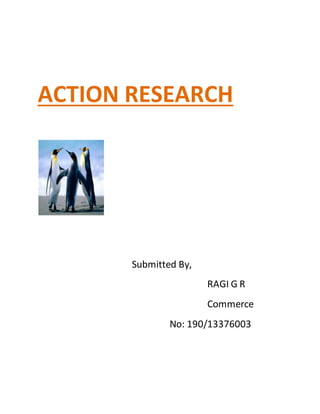
Action research (2)
- 1. ACTION RESEARCH Submitted By, RAGI G R Commerce No: 190/13376003
- 2. INTRODUCTION Action research is a practical approach to professional inquiry in any social situation. The examples in this component relate to education and are therefore of particular relevance to teachers or lecturers engaged in their daily contact with children or students. But professional practice need not be teaching. It may be management or administration in a school or college, or it may be in an unrelated area, such as medicine or the social services. The context for professional inquiry might change, but the principles and processes involved in action research are the same, regardless of the nature of the practice. Action research involves the careful monitoring of planned change in practice. Applied research also known as action research. It’s associated with particular projects and problem. Such research being of practical value may relate to current activity or immediate practical solutions. It aims at finding a solution or classrooms. Action research concerned with school problems and is carried on by school personal to improve school practice.
- 3. Educational research seeks to discover knowledge; action research aims at gathering evidence that relates to a specific problem. It is a research designed to solve a problem that have a direct application in the setting in which the research is conducted. Action research is a type of applied research or decision-oriented research. The researcher is the practitioner himself, who will take the decision and enjoy its benefit. According to Stephen M Corey,”Action research is a process for studying problems by a practitioner scientifically to take decision for improving their current practices”. OBJECTIVES OF ACTION RESEARCH Action research projects are conducted for achieving the following objectives. 1. To increase the students achievement level in comprehension and oral language. 2. To develop teaching strategies that may assist in increasing the student’s comprehension. 3. To improve the working condition of various infra-structural components of a school.
- 4. 4. To develop scientific attitude among teachers where by they are motivated to study problems scientifically before taking decisions. 5. To develop democratic attitude among students and teachers while understanding and solving their problems. 6. The root out the conservative and static environment prevailing in most schools. 7. To make the school system effective for generating a healthy environment conducive to learning. STEPS OF ACTION RESEARCH 1. Identification of problem : A teacher should be sensitive towards job activities. The problem should be need based. He must be really interested in the problem. It must arise from his own experience. It must be simple in nature and scope. 2. Pin-pointing the problem : After identifying the problem, it should be defined. So that goal and action could be specified. If the problem is related to teaching and learning it is to be localized in
- 5. terms of class, subject, group and the period in which the teacher perceived the problem. 3. Analyzing the causes of the problem : The cause of the problem are analyzed with the help of theory, previous experience, preliminary evidence etc. The nature of the cause is also analyzed to determine whether it is under the control or beyond the control of an investigator. This helps in formulating action hypothesis. 4. Formulating action hypothesis : This involves individual’s commitment to some definite action leading to the solution of specific problem. The basis for formulating action hypothesis is the causes of the problem identified by the investigator. The statements of action hypothesis consist of two aspects, action and goal. It includes that the action should be taken for achieving the goal. 5. Design for testing the action hypothesis : The design is developed for testing the most important action hypothesis. Some action may be taken and their results observed. The design of action research
- 6. is flexible and can be designed at any time according to the convenience of the investigator. 6. Conclusion : Accepting or rejecting the action hypothesis leads to certain conclusions. The conclusions are meant to make decisions regarding action to be taken for modifying and improving the current practices concerned, with a view to solve the problems lead to the action research. LIMITATIONS AND CRITICISM OF ACTION RESEARCH Lack of time. Validity as research. Unfamiliarity with research methods. Action research produces results which are not generalisable. Representations of the process of action research may confuse, rather than enlighten. In contradiction with the main principles of the process.
- 7. CONCLUSION Action research is a practical way for individuals to explore the nature of their practice and to improve it. Action research proceeds in an action-reflection cycle or spiral. It is carried out by individuals, but these individuals may collaboratively. Action researchers must ensure triangulation in their methods. Quantitative and qualitative research methods are using the action research. REFERENCES Dr.S.Dandapani, “Advanced Educational Psychology”, Anmol publications Pvt. Ltd, New Delhi. File:///c:/Users/Hp/Sharrock-Objectives of action research.htm. File:///c:/Users/Hp/Action research in Education .htm.